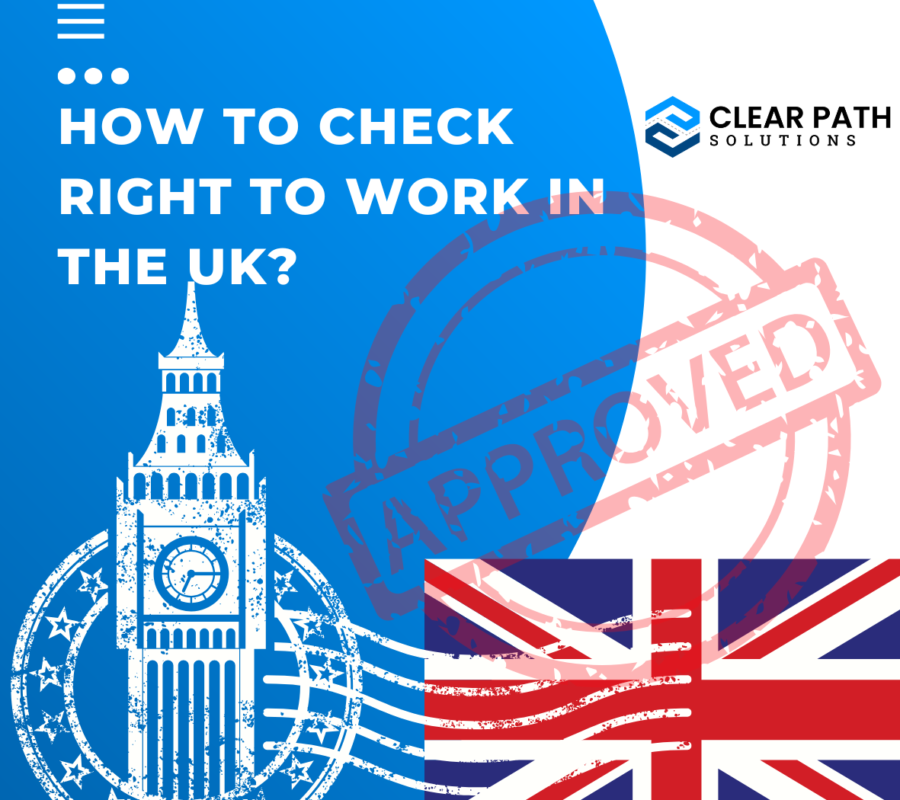How to Check Right to Work in the UK?
A Complete Guide for Employers and Employees
In an increasingly trend of organisations employing global workforce, verifying the right to work in the UK is an essential legal and procedural step for both employers and job seekers.
Whether you’re an employer hiring staff or a foreign national seeking employment, understanding and conducting the correct checks ensures compliance with UK immigration laws and avoids legal penalties.
This comprehensive guide explores the process from both employer and employee perspectives, explaining who has the right to work, how to check it correctly, and what documents or systems are involved.
What Does “Right to Work in the UK” Mean?
The “right to work” refers to a person’s legal entitlement to be employed in the United Kingdom. This depends on their nationality, immigration status, and type of visa (if applicable).
- British citizens automatically have the right to work.
- Irish citizens also enjoy the right to work under the Common Travel Area agreement.
- EU, EEA, and Swiss citizens must have immigration status post-Brexit, typically under the EU Settlement Scheme or another visa.
- Non-EU nationals generally require a visa that permits work, such as a Skilled Worker visa.
How to Check Right to Work in the UK: Employer Perspective
Why It’s Important?
Employers in the UK are legally required to check that all employees have the right to work before they start employment. Failure to do so can result in civil penalties up to £20,000 per illegal worker, reputational damage, and even criminal charges in serious cases. Follow the below listed steps:
1. Obtain Original Documents
You must ask for original documents from the list approved by the Home Office. These documents are grouped into:
List A: For those with permanent right to work (e.g., British passport).
List B: For those with temporary right to work (e.g., visa holders).
2. Check the Validity of the Documents
When reviewing documents, you must ensure:
- They are genuine and belong to the person presenting them.
- Photos are consistent with the appearance.
- Dates of birth match across documents.
- Visa or leave to remain has not expired.
- There are no signs of tampering or forgery.
3. Make and Retain Copies
You must take clear copies of the documents and retain them securely, ideally in a digital format. Make sure to:
- Record the date of the check.
- Keep documents for at least 2 years after employment ends.
4. Conduct an Online Right to Work Check (Where Applicable)
Some individuals may provide a share code, allowing you to check their status online via the UK government’s Right to Work Checking Service.
To do this, you’ll need:
- The applicant’s share code
- Their date of birth
This check is typically used for:
- EU citizens with settled/pre-settled status
- Non-EU citizens with biometric residence cards or digital immigration status
The result of the online check should be saved (printed or in PDF) as part of your records.
5. Follow-Up Checks for Temporary Status
If the employee has time-limited permission, you must recheck their right to work before it expires. The schedule for this recheck depends on the visa expiration date and whether the individual has applied to extend their stay.
Additional Points to take care for Employers:
- Avoid discrimination: You must check all employees, regardless of nationality, to avoid discriminatory hiring practices.
- Use certified IDSPs: For UK and Irish citizens, employers can use Identity Service Providers (IDSPs) to perform digital checks on valid passports.
- Keep up-to-date with Home Office guidance, as immigration laws and rules can change frequently.
How to Prove Your Right to Work in the UK? (Employee Perspective)
Why It Matters?
As a job seeker or current employee, proving your right to work is a legal obligation. Failing to do so can lead to job offers being withdrawn, loss of employment, or even immigration penalties.
Key Scenarios and How to Handle Them
- British and Irish Citizens
You can prove your right to work with:
- A valid UK or Irish passport
- A birth or adoption certificate plus official government-issued proof of National Insurance number
An expired passport is acceptable for British citizens as long as it proves identity.
- EU, EEA, and Swiss Citizens
Post-Brexit, you cannot rely solely on your passport or national ID card. You need:
- Settled or pre-settled status under the EU Settlement Scheme (EUSS)
- A share code to provide to your employer via the Home Office online tool
To generate a share code:
1. Visit the UK Government’s Prove your Right to Work page
2. Log in using your ID document or UK Visas and Immigration (UKVI) account
3. Choose to generate a code for your employer
3. Non-EU Nationals
You will need to present:
- A valid Biometric Residence Permit (BRP)
- A visa allowing work (e.g., Skilled Worker visa)
- A share code (for digital immigration status)
Your visa type must allow the kind of work you’re applying for. For instance, some student visas limit hours or restrict work types.
4. Asylum Seekers and Others with Pending Applications
You may be allowed to work while your immigration case is being decided. In this case, the employer must request a Positive Verification Notice from the Home Office Employer Checking Service (ECS).
Some more Tips for Employees or Candidates seeking Job in the UK:
- Keep documents updated: If your visa or BRP is expiring, apply for an extension well in advance.
- Communicate clearly with employers: Provide your documents or share code early in the recruitment process.
- Check your status regularly: Visit the View and Prove page to make sure your details are correct.
Common Mistakes to Avoid (Be an Employer or a Job Seeker)
- Employers relying only on verbal confirmation or not copying documents
- Employees providing expired or incorrect documents
- Not checking visa restrictions (such as maximum hours for student visa holders)
- Failure to recheck temporary visas before expiry
Penalties for Non-Compliance
For Employers:
- Fines up to £20,000 per illegal worker
- Possible criminal prosecution
- Loss of sponsorship license for visa workers
- Damage to brand and public image
For Employees:
- Risk of being refused employment
- Termination if found working without proper authorization
- Immigration consequences, including visa cancellation or deportation
Remember
Understanding how to check the right to work in the UK is critical in today’s talent market highly comprising of diverse workforce. For employers, it ensures compliance, protects the business, and promotes fair hiring. For employees, it enables a smooth hiring process and career progression without legal hurdles.
Both sides benefit from awareness, proper documentation, and use of official government tools. When in doubt, always consult legal or immigration experts—or refer directly to Home Office guidance.
Some Useful Resources:
- Right to Work Checklist for Employers (Gov.uk)
- Prove your Right to Work (for employees)
- Employer Checking Service (ECS)
By staying informed and proactive, employers and employees alike can ensure a lawful and successful working relationship in the UK job market.





